SanDisk Ultra II (240GB) SSD Review
by Kristian Vättö on September 16, 2014 2:00 PM ESTRandom Read/Write Speed
The four corners of SSD performance are as follows: random read, random write, sequential read and sequential write speed. Random accesses are generally small in size, while sequential accesses tend to be larger and thus we have the four Iometer tests we use in all of our reviews.
Our first test writes 4KB in a completely random pattern over an 8GB space of the drive to simulate the sort of random access that you'd see on an OS drive (even this is more stressful than a normal desktop user would see). We perform three concurrent IOs and run the test for 3 minutes. The results reported are in average MB/s over the entire time.
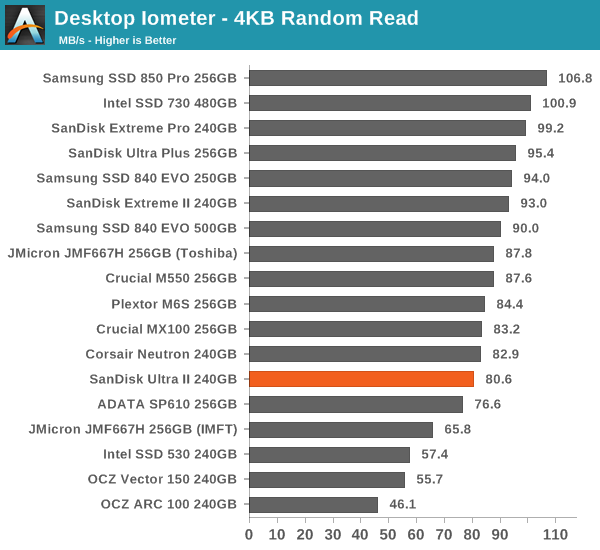
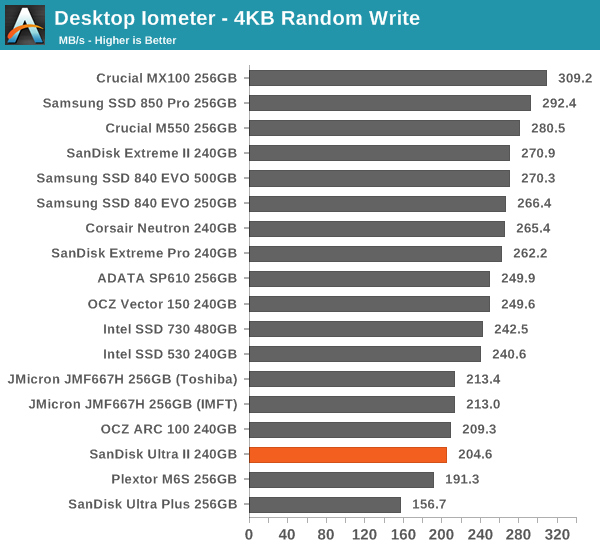
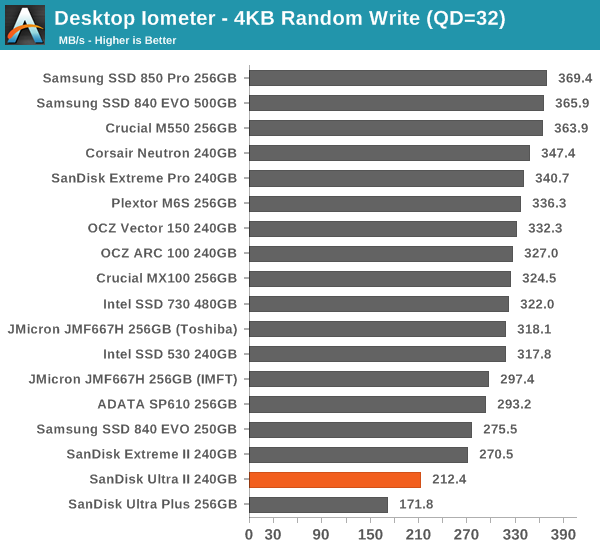
Random performance is decent but not overwhelming. I am surprised that the Ultra II is not faster considering the SLC cache that nCache 2.0 provides. Random write performance especially is a bit slow by today's standards and does not scale with queue depth, but for light client usage the Ultra II should still be fine.
Sequential Read/Write Speed
To measure sequential performance we run a 1 minute long 128KB sequential test over the entire span of the drive at a queue depth of 1. The results reported are in average MB/s over the entire test length.
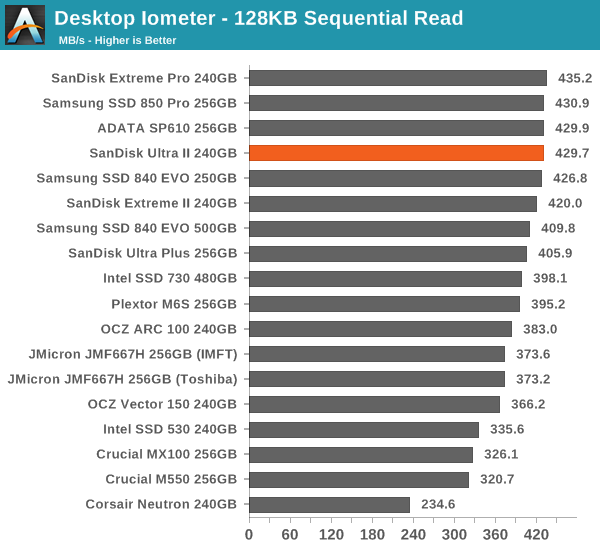
Fortunately sequential read performance is much better, although sequential write performance gets handicapped due to TLC, similar to the 840 EVO.
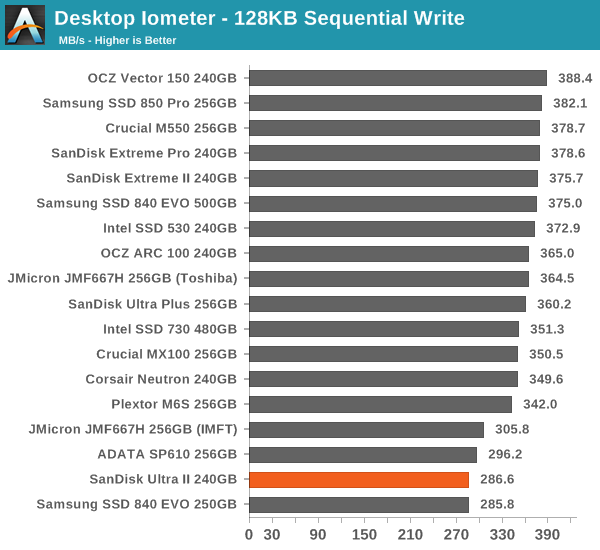
AS-SSD Incompressible Sequential Read/Write Performance
The AS-SSD sequential benchmark uses incompressible data for all of its transfers. The result is a pretty big reduction in sequential write speed on SandForce based controllers, but most other controllers are unaffected.
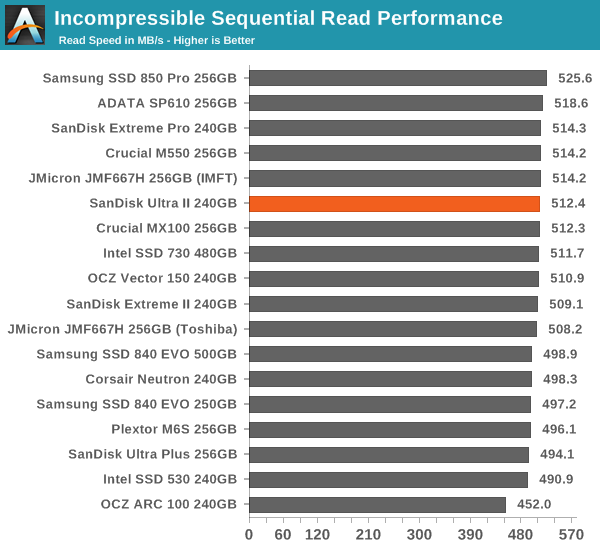
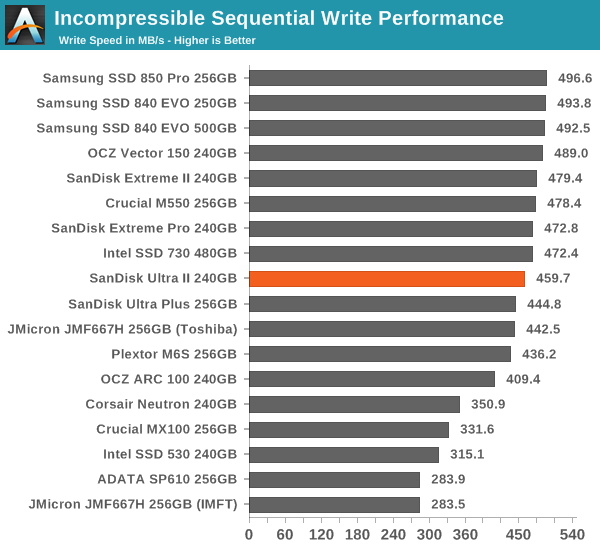










54 Comments
View All Comments
maecenas - Tuesday, September 16, 2014 - link
Interesting stuff, good to see that competition is picking up in this market. I think it will be a significant threshold moment when we see the 240gb SSDs drop below $100.NeatOman - Tuesday, September 16, 2014 - link
I just saw an OCZ Vertex 460 240GB drive go for $104 the other day on newegg, and of course there sold out. Thats Nucking Futs, since i bought a 120GB 840 pro last year for $140 and the speed looks to be about the same, possibly faster in some ways on the OCZD. Lister - Sunday, October 12, 2014 - link
But then, it is OCZ, and many people who know their tech history, wouldn't take an OCZ SSD for free (regardless of whether they are right or wrong in doing so).simonrichter - Friday, October 3, 2014 - link
I agree, really interesting to see and I'm looking forward to see what the future holds for SSDs. /Simon from http://www.consumertop.com/best-computer-storage-g...CamdogXIII - Tuesday, September 16, 2014 - link
I bought my first SSD back in 08. 16GB for 80$ Second SSD was 32GB for 100$. Third SSD was 64GB for 100$. Just bought a 256GB 840 Pro for 160$. We have come a long way.PICman - Tuesday, September 16, 2014 - link
Having an SLC cache is clever. I also like the low power consumption, reasonable performance, and especially the low price. I've had bad luck with the reliability of Samsung products, so it's great that they are getting some competition.Wixman666 - Wednesday, September 17, 2014 - link
I've had nothing but stellar performance from Samsung SSDs. I have dozens of them out in the field, and not one single failure. Sandisk is OK as well... OCZ might end up OK since Toshiba owns them now.Essence_of_War - Tuesday, September 16, 2014 - link
I feel like with every new ssd review I read, I grow to appreciate the fantastic value that the MX100 represents even more.frontlinegeek - Saturday, September 20, 2014 - link
Totally agree. We just outfitted our development PCs at work with MX100 256 GB drives and they are utterly fantastic for price/performance. I cannot at all get over how big an impact an SSD at work makes. FAR more than at home I can say. At least for average home use.We run multiple Visual Studio sessions and Oracle SQL Developer along with browsers and other misc apps so the impact has been just terrific.
fanofanand - Thursday, May 12, 2016 - link
I know this article is old, but I was researching SSD's and as I trust Anandtech over any other tech site, I came here for the truth. The sad reality is, the MX100 has been overly praised, and is now priced (on Amazon) $72 more than the Sandisk Ultra II at same/similar (512 vs 480) capacity. The MX100 isn't Ultra 2 good......